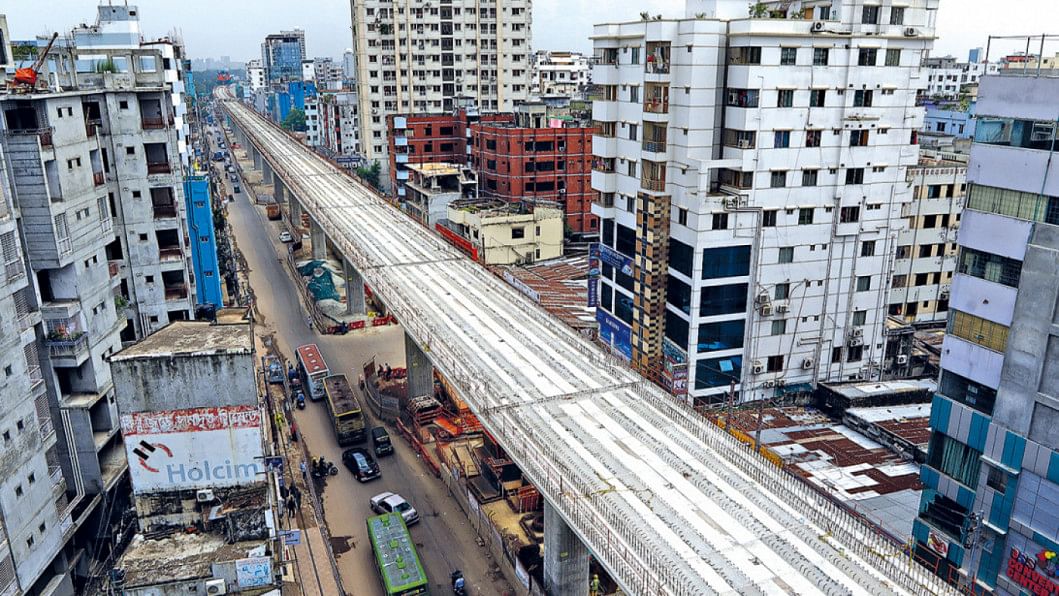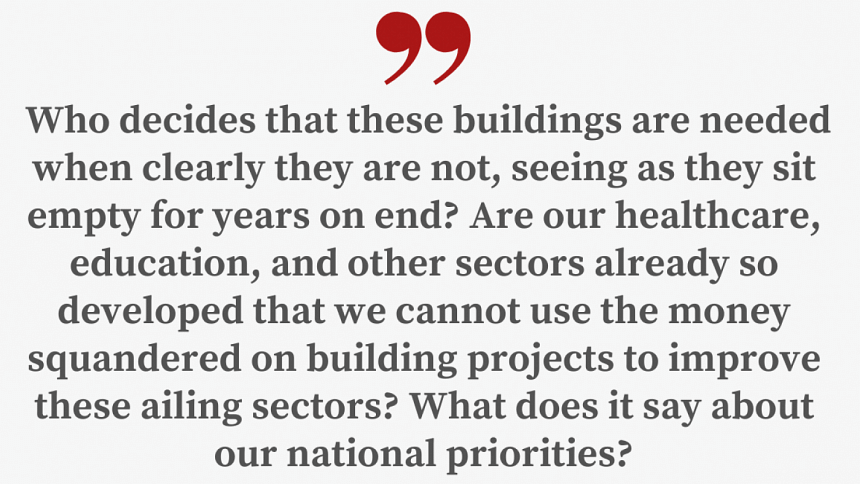Why are our resources wasted on lavish building projects?

Megaprojects are an inescapable lure for the government. They provide politicians and government officials with great opportunities to pocket public funds, while they get to show massive visible development – i.e. roads, bridges, and buildings – to the people. However, even those high-cost buildings seem to be a waste when they are left unused for years after their construction is complete.
That is exactly what has happened with government housing built for officials in Mirpur. According to a report by Prothom Alo, most of the five multi-storey buildings built in Mirpur-6 Kather Karkhana neighbourhood in Dhaka have been left unused for the past two years. Officers are not interested in living there as it is far away from their workplaces. The situation is much worse in the Shialbari area in the same section, where all six buildings of the project are left unused. This has not just happened in the capital – 15 multi-storey buildings in Noakhali and Narayanganj are not being used like this. In total, more than 1,800 of 2,385 flats are currently left unused.
This is an unacceptable waste of public money. A large sum was spent on these projects without conducting a proper assessment of the demand for flats in the areas that they were built in, according to sources cited by Prothom Alo. The Directorate of Government Accommodation was never even consulted in this regard. It seems as though these buildings were built just for the sake of increasing the number of projects under a department, without any regard to the amount of public money that was spent on them. Bureaucrats in Bangladesh already enjoy too many benefits, from government-sanctioned housing to cars, and even to staff for their care in some cases. Making even more accommodation spots for them, especially in areas where they do not even want to move to, is simply an inexcusable waste of our already limited resources.

This is not an isolated situation either. In another case, the government constructed a 13-storey building at the cost of a whopping Tk 229 crore near the Election Commission office in the capital's Agargaon area three years ago, intending to accommodate the science and technology ministry there. However, the building is currently vacant as the ministry is unwilling to relocate its office from the Secretariat Building to Agargaon. This has happened because of the clustering of all government work at the secretariat and the lack of decentralisation of government services. To utilise such a massive project, the government should force decentralisation and make the relevant ministry move out of the secretariat.
But it has not been able to do so yet. Instead, it is trying to rent out the building separately to different government agencies – without any success yet as the agencies that rented the office spaces are yet to move into the complex.
In a separate case in Narayanganj, the chief judicial magistrate court building, which was built at a cost of Tk 32 crore on the Shayesta Khan road, has been left unused for the last three years.
Examples like these are, sadly, aplenty. Several other examples can be drawn to highlight the wastage of taxpayers' money in building infrastructure that contributes to nothing. So the questions that need to be asked are: why do we need to build these structures? Who decides that they are needed when clearly they are not, seeing as these buildings sit empty for years on end? Are our healthcare, education, and other sectors already so developed that we cannot use the money squandered on building projects to improve these ailing sectors? What does it say about our national priorities?
Our government's priorities should be simple: ensuring the maximisation of public welfare. Wasting money on lavish government buildings is the last thing that they should do. We should be very frugal about spending money on building projects, and our prime minister's calls for austerity are a great step forward. However, if the spending spree on these projects carries on, there will be no public benefit out of the stated measures.
Our nation is ailing from many maladies. Countering those should be our priority right now. We need to make sure that our people get the proper education, healthcare, assistance, training and social safety – the basics – that they so direly need and deserve. The public money wasted on useless building projects can be better utilised to meet those needs. The government must be careful about its projects so that they do not waste any money, especially in these times of economic hardships.
Anupam Debashis Roy is editorial assistant at the Daily Star.

 For all latest news, follow The Daily Star's Google News channel.
For all latest news, follow The Daily Star's Google News channel. 






Comments